The Vocal Retrospective
September 2021
 |
Ralph Moore |
Mike Parr |
 |
A series of monthly musings by two members of the MusicWeb International review team who share a deep fascination with opera and vocal music in general. Each month we shall take a glance back at something of interest that appeared on commercial CD from the accumulated history of classical vocal recordings.
Les Introuvables du Chant Français - Volume 1
|
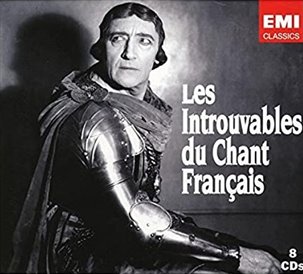 |
|
After spending our summer taking a look at recordings that came out of two of the major European Summer Festivals of opera we now take a suitably autumnal glance back into the distant past at the treasure trove of French delicacies that were released by EMI in their “Introuvables” series that was first issued in 2004. The word Introuvables corresponds to the English phrase “difficult to find” or seek out. EMI would semi-regularly release large boxed sets of rare historical recordings under this heading during the late LP era and well into the days of CDs. Most of these recordings have not yet made it into the era of digital downloading or streaming but it is hoped that Warner will get around to them before too much time has passed. The set we look at this month was issued on eight CDs divided into box sets of four with extensive notes. Many of the tracks had been cleaned up and issued on CD for the first time with this release.
CD 1 Le ton classique:
Ralph: Having just listened to so many of the CDs in Robert Massard’s recording legacy, I had his especially appealing timbre still in my head and found that the very first two tracks by Charles Panzéra and Gérard Souzay and the fifth track with Camille Maurane, all reminded me that he was in an established French baritonal tradition. There is a specifically Gallic sound to their voices: some slight, attractive nasality, pellucid diction and an ease and lightness to their execution of notes above the stave.
Mike: Gérard Souzay’s singing of an air by Lully is absolutely delectable despite the non-period performing style. Many current artists who specialize in this repertoire would do well to take note of the light and shade that he brings to the music. Similarly, Camille Maurane’s rendition of an air from Rameau’s Les Indes Galantes is notable both for his performance but also for the fact that it is performed with full chorus and orchestra which was something that was quite unusual for baroque music in 1942.
Ralph: These qualities are characteristic of French tenors, too; Miguel Villabella might have been of Spanish birth but his training and career were almost exclusively French and you may hear how he, as an adoptive Frenchman, is part of the same vocal tradition which nurtured more recent singers like Alain Vanzo.
Mike: Villabella has an interesting sound and he pops up a few times throughout the first volume in repertoire that ranges from Lully, where he displays a perfect example of the French technique of the “voix mixte”, to music by Hérold and Bizet.
Ralph: Sometimes the vocal nasality – partly a product, surely, of singing in a language to which that trait is intrinsic – can sound excessive. The acoustic recording process tended to exaggerate it and sometimes it is apparent in beautiful voices such as that of contralto Alice Raveau or tenor Fernand Ansseau and even in Caruso’s recordings. However, there is nothing of that in the three contributions of Gluck’s music sung by Suzanne Balguerie, whose soprano is so pure, fluty and rounded, like a French Alma Gluck – only one could wish that she sang “Divinités du Styx” up to a proper tempo, as it drags lugubriously.
|
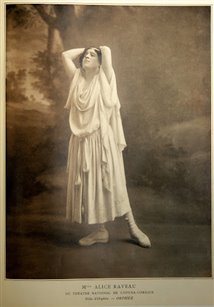
Alice Raveau as Orphée |
|
Mike: The section of Gluck arias by Suzanne Balguerie brings up a point about the differing quality of the shellacs from various companies. It is clear that the recording equipment used by some companies was not the equal of that used by others. For example, in the 1930 Columbia of Alceste’s “Non, ce n’est point un sacrifice” Balguerieis heard with great clarity and immediacy whereas in the other Gluck arias from Alceste and Iphigénie en Tauride the 1928 Polydor shellacs she sounds like an entirely different singer.
Ralph: One singer leaps out to seize the listener’s attention through the sheer beauty of his voice and the charisma of his characterisation: Georges Thill is, for me, always the Prince of French tenors. The power, delicacy and control of his voice are beyond praise and he makes his mark on the first disc via only two tracks, an aria from Cherubini’s forgotten opera Les Abençérages, which has the fingerprints of the preceding Medea all over it, and another from Berlioz’ Les Troyens, still very much in the repertoire. He sings Énée with just the heroic elan that Berlioz must surely have wanted, concluding with a ringing B flat. It is then the turn of mezzo-soprano Georgette Frozier – a singer I did not know – to continue in the same opera, delivering part of Dido’s death scene. Her voice is large and sumptuous but its flutter/tremolo is irksome and I much prefer the third Berlioz item, “D’amour l’ardente flamme” from La damnation de Faust, voluptuously but vividly sung by Germaine Martinelli. She, too, has a fast vibrato but it is still within aesthetic limits. As ever with singers of that vintage, the proper development of her lower register is very much in evidence.
|
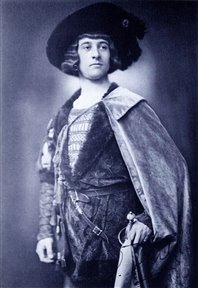
Georges Thill as Faust |
|
Mike: The album producer chose to include only the final third of Énée’s aria is mystifying because Thill recorded the entire scene complete. I was rather struck by the clarion tones that came from Fernand Ansseau particularly in Adméte’s aria from Alceste.
Ralph: The same bleating vibrato tic is obtrusive in the singing of the young René Maison singing Faust’s “Nature immense”; frankly, I find it a touch risible and it gives me no pleasure. Much more enjoyable is Panzéra’s suave, if somewhat effete, Méphisto.
Mike: I think that Belgian tenor René Maison is one of those voices that the gramophone treated unkindly to but when he was heard live in the opera house his natural timbre was smoothed somewhat by the acoustics of the auditorium. He certainly had a major career throughout the 1930’s. Panzéra is listed as a baritone in the booklet but the assured suavity that Ralph describes in Mephisto’s serenade is exactly my cup of tea for this music and strikes me as nuanced rather than effete.
Ralph: Germaine Cernay is another rich, fluting soprano and probably the best-known of the female singers on the first disc. She sings a brief aria from Fauré’s rarely performed Pénélope which hardly gives her much opportunity to demonstrate her manifold gifts.
|
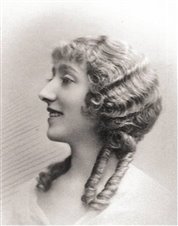
Germaine Cernay |
|
This first CD concludes with an aria from an opera with which I have several times tried and failed to engage, Magnard’s Guercoeur, sung by a baritone of whom I have never heard - but then, these are purportedly “introuvables”, so that is hardly surprising.
Mike: The baritone that Ralph refers to is an interesting example of a singer who completely adopted the French style. Arthur Endrèze was a Chicago-born singer originally named Kraeckmann who changed his surname to something more Gallic. He studied in Paris like so many other singers under the famed Jean de Reszke. He spent nearly his entire career in France.
CD 2 Meyerbeer et le grand opéra:
Mike: the second disc of the set takes us through the traditional dramatic and frequently gargantuan works known as Grand Opera that Paris became famous for during the 19th C. The disc begins with the wonderful André Pernet in the second half of the famous scene of the Blessing of the Swords from Les Huguenots complete with the chorus, who gets the lion’s share of the music. It is a pity that the first half of the scene, which includes several other soloists, was not recorded because that is the far more interesting music from a vocal standpoint.
Ralph: This CD features another two composers of operas whose charms usually evade me: Meyerbeer and Thomas, although I readily concede that both were capable of writing some memorable, individual numbers which further gain from being sung by singers of the calibre of César Vezzani, my other favourite French tenor alongside Thill.
Besides, the quality of the voices here presents the music in its best guise even if I still find much of it, to employ a fine French word, to be “fadasse” (bland, insipid). I really dislike the viola introduction to Raoul’s “Plus blanche que la blanche Hermine” and the calculated nature of the aria itself irks me, too; everything Meyerbeer does seems to me to be self-conscious and artificial – but then the beauty of André d’Arkor’s tenor counteracts that artificiality and I cannot help but enjoy his singing as vocalisation per se. The same is true of Léonce Escalais’ singing of the aria from Robert le diable – an opera I cordially detest.
Mike: I don’t have the same strong reaction to Meyerbeer as Ralph. I was impressed by the vibrant tone of André d’Arkor in the aria from Les Huguenots although I do detect a tendency towards a sort of drag on his pitch at times which the close recording accentuates. He also shows up on the third CD singing an aria from Boildieu’s La Dame Blanche which happens to be an opera that I find very hard to like.
|
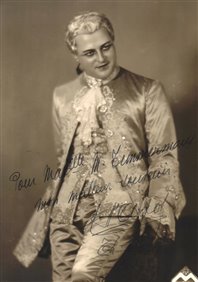
André d’Arkor as des Grieux |
|
Ralph: Le prophète is a better work but contains its fair share of tedium. Blanche Deschamps-Jehin has a great, old-school voice but her account of “O mon fils” is unlikely to win many new adherents to the opera whereas César Vezzani’s tub-thumping account of Jean’s aria is so vocally arresting as to make the coarse music interesting. Ansseau’s delivery of “O paradis” combines expert singing with better music but his version is not a patch on Caruso’s. Frankly I prefer to pass on to his singing the music of a superior opera, Halévy’s La Juive, which has been sporadically revived with some success. It was, after all, the last role Caruso added to his repertoire and the last opera he performed, so he clearly thought highly of it, as do I. Vezzani is scarcely inferior to Caruso, especially in the famous aria “Rachel, quand du Seigneur”; his outburst on “O mon pere, épargnez votre enfant” (O my father, save your child) is thrilling.
Mike: Moving onwards to Ambroise Thomas’ Hamlet, Endrèze returns for a superb account of the Ghost scene, while the Norwegian soprano Eidé Noréna provides a fragile-sounding Ophélie in the rarely recorded Second Act aria instead of the more famous Mad Scene. A very young Janine Micheau provides us with a perfectly poised account of the Mad Scene, filled with pristine tone although a more picturesque form of madness rather than the rather more desperate and dramatic version by Maria Callas. Lastly, the famous Vanni-Marcoux, who gets the honour of being the cover boy of the set, is represented in the “To be or not to be” scene where he displays superb diction but a vocal timbre that is not really ingratiating.
|

Émile Scaramberg
|
|
Ralph: I am puzzled as to why Reyer’s Sigurd is now quite so neglected. I find much in it to enjoy and am happy to find it so well served in the five excerpts here, sung by stellar artists. Émile Scaramberg’s 1904 recording to piano accompaniment is one of the oldest in this collection – most recordings are from the 20’s and 30’s - but surprisingly immediate. He is wrongly billed as a baritone but surely sounds like a Heldentenor - if not at least a baryton-Martin - with a ringing top B; checking his biography online, I see that he was indeed a tenor who sang a wide range of roles from Raoul in Les Huguenots and Gounod’s Faust to heavier parts such as Radames and Tannhaüser. Marjorie Lawrence is an equally lovely Brunehild; hugely powerful with secure development at both extremes of her voice. (She was, of course, a superb Brünnhilde to Melchior’s Siegfried in the1936 Met Götterdämmerung.) Maurice Renaud and Rose Caron each sing an aria and we can marvel at the fact that we can hear their artistry over a gap of nearly 120 years.
Mike: There are not enough excerpts from Saint-Saëns’ Samson et Dalila, considering how important a work it was in the survival of French opera during the first half of the 20tC. The producer only offers us two tracks from this wonderful opera. The Parisian Paul Franz is mightily impressive in Samson’s Act 1 aria which emerges from across the years with a jaw-dropping intensity. I will sadly pass on Georgette Frozier’s too plummy sounding account of Dalila’s main aria. I have always preferred a mezzo with a more slender and alluring tone for this femme fatale of the Boulevards.
|
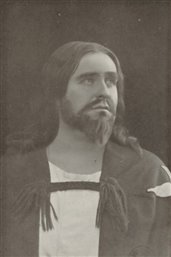
Paul Franz as Parsifal |
|
CD 3 L’opéra-comique jusqu’á Carmen
Ralph: A lot of the music on the third Opéra-comique disc has dropped out of fashion and a number of the singers here have also been forgotten – although famous names such as Pol Plançon, Ninon Vallin and Emma Calvé do appear, the latter being especially celebrated for her Carmen. I cannot say that much of the music here holds any great appeal for me; there are some individual hits but a lot of it is beautifully sung fluff and I am minded to skip over it. Lucien Fugère singing delicately in his early 80’s is a curiosity but not necessarily something for repeated hearing, any more than Reynaldo Hahn’s bar-room crooning of “O Nadir” is a classic. David Devriès effete, tremolo-ridden tenor gives me no pleasure and indeed too many of the voices in this section share that fault, including Friant’s powerful but tremulous Don José. They stand in stark contrast to the vocal quality displayed by such as Plançon and Vallin and the difference in musical quality between the excerpts from Bizet’s operas and what precedes them is similarly apparent – not that there is necessarily anything terribly striking about the singing of the three numbers from Les pêcheurs de perles, good as they are. Calvé’s vocal is just about audible through the crackly old recordings but there is no denying that her style and mannerisms sound very old-fashioned to modern ears. In truth, the collection on this disc is one I can easily dispense with.
|
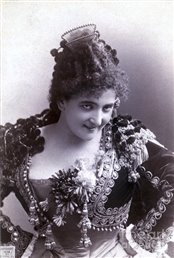
Emma Calvé as Carmen |
|
Mike: I cannot be as dismissive of the music of the Opéra-comique, containing many musical gems from Mignon, Les pêcheurs de perles, and Carmen among others. After all, a spoonful of fine French honey can make the harsh medicine of other heavy weather music become a lot easier to digest. Many of these numbers I have loved throughout my life and I don’t believe their varied delights have diminished over the years. On this disc I found Pol Plancon’s singing to be thoroughly stylish in little-known arias from Le Caïd and Le Chalet. Then Miguel Villabella returns with heady accounts of arias from Le Pré aux Clercs and Nadir’s Romance from Les pêcheurs de perles. Fannely Revoil is captivatingly effervescent in the Aragonaise from Le Domino Noir - a perfect example of the singer commanding the music rather than the other way around. Ninon Vallin and André Baugé are simply superb in a patter duet from Les Noces de Jeanette. The aforementioned Vanni-Marcoux redeems himself utterly with an authoritative version of Lothario’s sad little aria from Mignon. Soprano Cécile Merguillier, whose name was previously unknown to me, contributes a thrilling, tour-de-force version of an aria from Massé’s Galathée. The recording, made in 1905, is accompanied by one of those charming spoken introductions which happened in the early days of the gramophone, presumably to replicate the experience of an artist introducing their live concert encores.
CD 4 Gounod:
Ralph: Continuing in curmudgeonly vein, I am not especially enamoured of Gounod’s operas, to which the fourth CD is devoted and which again, despite the beauty of some individual numbers, have not worn well and are no longer the most oft-performed in the repertoire as once they were.
There is, however, undoubtedly much beautiful singing from an array of stellar voices here giving us the best of Gounod, from the velvety soprano of Marie de Reszké, to the brilliance of Géori Boué in the pretty aria from Mireille, to the haunting account the famous “O ma lyre immortelle” from Félia Litvinne, to the warmth of Charlotte Tirard’s “Nuit resplendissante” and “Plus grand dans son obscurité”, arias which will not necessarily be familiar to many. Common to all these voices is proper lower-register development of a really dark, trenchant kind coupled with large, fluting top notes and a wholly dependable, firm middle voice. A later (1953) recording from a young Renée Doria evinces a slightly more brittle, soubrettish quality but the same quick vibrato and ability to colour phrases. Gabriell Ritter-Ciampi has a similarly slightly thin, shrill but charming quality in her account of the ultimate Gounod display aria, Marguerite’s “Air des bijoux”.
|
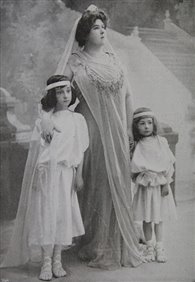
Félia Litvinne as Alceste |
|
Mike: Although I love the music of Gounod, I find myself inching closer to Ralph’s curmudgeonly feelings towards several of the tracks on this CD. I derived little-to-no enjoyment from the experience of hearing Litvinne in Sapho’s penultimate scene. Robert Couzinou’s Ballad of Queen Mab while animated, sounds to me a like a French music-hall performer who has been pushed onto the stage of the Opéra. I find the return of César Vezzani to be justified in his thrilling account of Adoniram’s aria from La Reine de Saba. Similarly, Géori Boué is deeply affecting in her version of Mireille’s more dramatic Act Two aria although there is no doubt she had the coloratura chops to do more than justice to the silly waltz song that one usually encounters from that opera, which has mercifully been left out of this set. My favourite items were actually the three duets from Roméo et Juliette. Those from Acts Two and Four are sung with bags of style by Eidé Noréna and Gaston Micheletti in good sound from 1928. Still, I derive the most pleasure from an old 1913 Victor disc of the First Act duet by Edmond Clément and Geraldine Farrar, which combines both style and a real sense of wide-eyed charm that still registers through the speakers after 108 years.
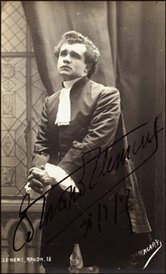
Edmond Clément as des Grieux |
|
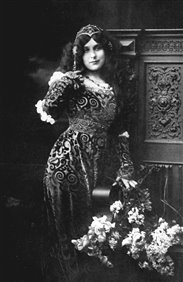
Geraldine Farrar as Juliette |
Ralph: I was unfamiliar with yet another elegant French tenor – but this time one with more lower-register integration – in Marcel Claudel, who sings a lovely “Ange du paradis”. Such voices have a special, plaintive quality about them without sounding saccharine; I would like to have heard his Werther. On the other hand, more Lucien Fugère seems to have been included on the same principle of Dr Johnson’s dog walking on two legs. I had much sooner listen to the other three baritones here in their prime, even if their manner and vocalisation sounds “old-fashioned” to modern ears. The older singers are not always necessarily faultless; often baritones like Armand Narçon have an easy top but their low notes are deficient in resonance – never the case with the great bass Pol Plançon in his perky aria from the comic Philémon et Baucis, complete with a proper trill. Otherwise, I am struck by how similar these older voices sound, reflecting the fact that they have been trained in a more vocally homogeneous tradition. This is very evident in Arthur Endrèze’ sly, sarcastic version of Méphistophélès’ Sérénade, where his timbre is definitely much lighter and leaner than the bass-baritone demons we have become used to hearing in Faust.
|
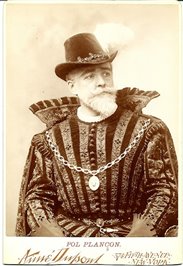
Pol Plançon in Les Huguenots |
|
The three celebrated “Corsican tenors” who graced the French stage in the 20’s and 30’s, are all represented here: Gaston Micheletti, José Luccioni and César Vezzani. They were superb artists but in my judgement the latter was the greatest of them; it is sad that his personal life was somewhat dysfunctional and that he spent the last three years of his curtailed life in poverty following a stroke. He and Luccioni have only one aria apiece on this disc but Micheletti has three. Luccioni has perhaps the most intrinsically beautiful tenor and Micheletti’s rapid vibrato might perturb some listeners; he is happily paired twice with Eidé Norena who is certainly sweetly girlish as Juliette but whose voice has just a touch of the Minnie Mouse about it. His “Salut demeure” is passionate, crisply enunciated, culminating in a pure falsetto top C on which he does something I have not heard another tenor do, which is to switch the words around to “où la présence se devine” – rather odd and presumably done to facilitate singing on a different, easier vowel - cheating, really.
We also hear Scaramberg again in another very fine, early recording with piano of a Björling favourite, “Ah! lève-toi, soleil” – and despite the intervening 116 years, it comes across splendidly, ringing B flats and all.
Les Introuvables du Chant Français
EMI 5858282 8 CDs [648:33]
This CD set is no longer available for purchase but can be found on the resale market, sometimes at a reasonable price. It is not currently available for either streaming or downloading. Many of the individual tracks can be located via a YouTube search, as most of them are no longer in copyright.
Next month we shall continue looking at this as we tackle the final four CDs which comprise Volume Two.
Tracklist of Volume One



 All Nimbus reviews
All Nimbus reviews








